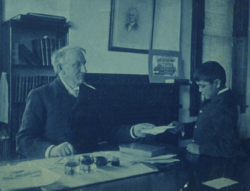Richard Henry Pratt facts for kids
Quick facts for kids
Richard Henry Pratt
|
|
|---|---|
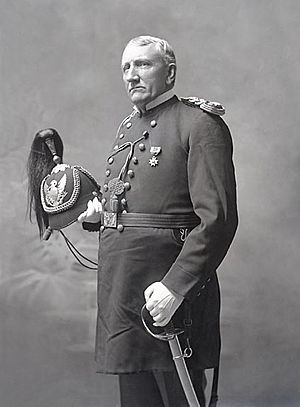
Richard Henry Pratt, as a Lieutenant in 1879
|
|
| Born | December 6, 1840 Rushford, New York, United States |
| Died | March 15, 1924 (aged 83) Letterman Army Hospital, California, United States |
| Buried |
Arlington National Cemetery, Virginia, United States
|
| Allegiance | United States Union |
| Service/ |
United States Army Union Army |
| Years of service | 1861–1903 |
| Rank | |
| Commands held | Carlisle Indian Industrial School |
| Spouse(s) | Anna Laura |
| Signature | |
Brigadier General Richard Henry Pratt (December 6, 1840 – March 15, 1924) was an American army officer. He is best known for starting and running the Carlisle Indian Industrial School in Carlisle, Pennsylvania. This school was very important in its time.
Pratt is also known for using the phrase "kill the Indian, save the man." This phrase described his idea that Native Americans should learn American ways. He believed this would help them succeed in society. In 1902, he was one of the first people to use the word "racism" to speak out against separating people by race.
Contents
Early Life and Family
Richard Henry Pratt was born on December 6, 1840, in Rushford, New York. He was the oldest of three sons. When he was young, he got sick with smallpox, which left scars on his face. In 1847, his family moved west to Logansport, Indiana.
In 1849, Pratt's father went to California hoping to find gold. Sadly, he died there. This meant young Richard had to help support his mother and two younger brothers.
Military Career
When the American Civil War began, Pratt joined the army. He first served for three months. Then, he joined again as a sergeant in the cavalry. He fought in the Battle of Chickamauga.
In 1864, while on a trip to Indiana, Pratt met Anna Mason. They got married on April 12, 1864. Eight days later, he became a first lieutenant.
Pratt worked in administrative jobs for the rest of the war. He left the army in May 1865 as a captain. He joined a group called the Military Order of the Loyal Legion of the United States. This group was for officers who fought for the Union during the Civil War.
After the war, Pratt returned home and opened a hardware store. But in March 1867, he rejoined the army. He became a second lieutenant in the 10th United States Cavalry. This was an African American regiment, and some of its members were formerly enslaved people. When they were sent to Fort Sill in Oklahoma Territory, Native Americans called them "Buffalo Soldiers" because of their hair.
Pratt spent eight years in the Great Plains during the Indian Wars. He was part of the Washita campaign in 1868–1869. He also fought in the Red River War from 1874–1875. After a very cold winter, many Native Americans surrendered. Pratt was in charge of talking to prisoners and interpreters. He tried to clear as many charges against them as possible.
Pratt was promoted several times. He became a captain in 1883, a major in 1898, and a colonel in 1903. He retired from the army in February 1903. In 1904, he was promoted to brigadier general on the retired list.
Fort Marion and Carlisle School
After the American Indian Wars ended, some Native American prisoners were sent to Fort Marion in St. Augustine, Florida. Pratt was chosen to supervise them because he understood both the Native Americans and their interpreters. He started to try out new ideas for education at the fort.
In the 1870s at Fort Marion, Pratt began teaching English, art, and crafts to prisoners. These prisoners had surrendered after the Red River War. He also gave the prisoners some control over their lives. He had them help with guard duty and other community roles. He also led them in marching and exercises.
On November 1, 1879, Pratt opened the Carlisle Indian Industrial School in Carlisle, Pennsylvania. This was the first of many boarding schools for Native Americans that were not on reservations.
Pratt believed his teaching methods could help other groups too. He thought his idea of "compulsory immersion education" could help other minorities in the United States. This included African Americans, Puerto Ricans, and others. He got some of his ideas from the Puritans.
Changing Native American Culture
Pratt believed in "Americanizing" Native Americans. This meant helping them fit into American culture. He thought that to become full American citizens, Native Americans should:
- Give up their tribal ways of life.
- Become Christians.
- Leave their reservations.
- Get education and jobs among other Americans.
He wrote that the government should "kill the Indian...to save the man." This meant changing their culture, not harming them physically.
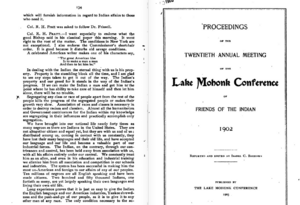
Pratt was a strong voice in the "Friends of the Indian" movement in the late 1800s. He truly believed he was helping Native Americans become "civilized." He said, "The Indians need the chances of participation you have had and they will just as easily become useful citizens."
Pratt respected Native Americans and believed they could be full members of society. This was different from many people at the time. Many thought Native Americans were less than human. Pratt pushed for people of different races to mix, even when others wanted them to stay separate.
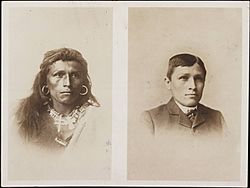
Pratt did not like the idea of keeping Native American tribes on reservations. He thought it made them easy targets for people who wanted to take advantage of them. This caused problems between him and the Indian Bureau. The Indian Bureau and others supported the reservation system. In 1904, Pratt spoke out against the Indian Bureau. He said it stopped Native Americans from becoming "civilized." Because of this and other disagreements, Pratt was forced to retire from the Carlisle School on June 30, 1904.
Today, many Native American tribes have mixed feelings about Pratt's boarding school programs. Some believe that the system he started was a form of cultural genocide. They feel it harmed their children and families.
Retirement and Death
After retiring, Pratt continued to give talks and share his ideas from his home in Rochester, New York. He passed away on March 15, 1924, at the Letterman Army Hospital in California. He was buried in Arlington National Cemetery in Virginia.
Pratt in Movies and TV
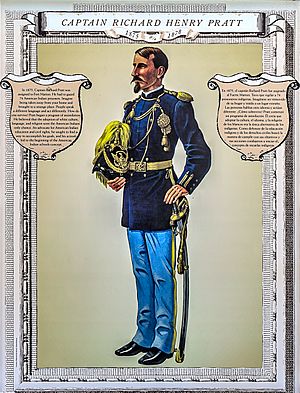
- The TV show The Great Adventure had an episode about Captain Pratt in 1964.
- Wayne Rogers played Pratt in a 1965 episode of the TV show Death Valley Days.
- In the 2005 miniseries Into the West, Keith Carradine played Pratt.
- The documentary Our Spirits Don't Speak English (2008) talks about Pratt's role at the Carlisle School.
 | Janet Taylor Pickett |
 | Synthia Saint James |
 | Howardena Pindell |
 | Faith Ringgold |


